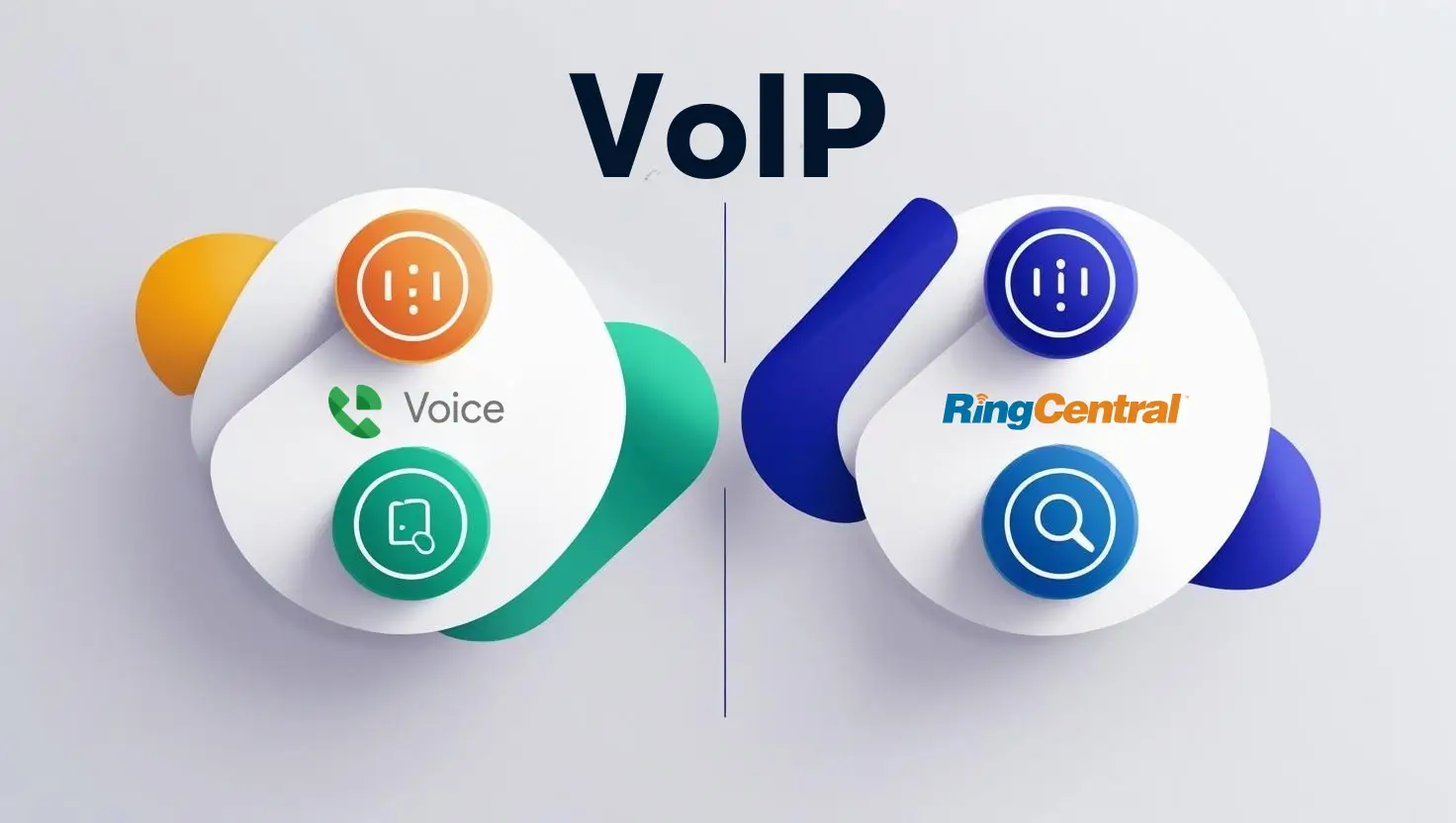Best Business VoIP Services in 2025
Last updated: September 2025
For small and mid-sized businesses, having a reliable and flexible communication system is essential—and that’s exactly what VoIP (Voice over Internet Protocol) services deliver. Whether you're managing remote teams, fielding customer service calls, or looking to cut costs on your phone system, VoIP offers scalable, cloud-based solutions with features far beyond traditional landlines.
- Sign up & cancel for free
- Enterprise-class features
- Intelligent call routing & management
- Flexible communications options
- Setup and switching is simple
- Mobile and desktop apps
- Try for free
- Cloud system with simple set-up
- Work from any device
- First month free
- World-class customer support
- Suitable for all business types and sizes
- 14-day free trial
- 24/7 customer support by phone
- Business messaging for team collaboration
- Save as much as 50% on your costs
- Free phone number porting
- Unlimited US, Canada, Mexico & Puerto Rico calls
- Designed with business ease in mind
- Smart collaboration tools
- Manage & collaborate on one admin portal
- 14-day free trial, Cancel anytime
- Unlimited calls & texts on any device
- Low-cost international calling
- Support for both softphones and desk phones
- Hosted business phone system
- 7-day free trial
- No hardware purchase required to setup
- Keep personal/business calls separate
- Free trial, Cancel anytime
- Easy-to-use & setup
- No onboarding fee & transparent billing
- 21-day free trial
- Great for growing teams
- Integration with other FreshWorks products
- 7-day free trial
- Event Management
- Simple Webinar Invitations
- 30-day money back guarantee
- Making cloud communication easier
- All-in-one solution suitable to different industries
- 30-day money-back guarantee
- Unparalleled 24/7 support
- A modern feature set
- Multi-device usage enabled
- Voicemail to text provided
- 3+ users, 7-day free trial for remote teams
- Integrates with other business tools in 1 click
- Dedicated onboarding managers for teams
- No contract required
- 24/7 J.D. Power certified support
- Complementary desktop & mobile app
- 30-day money-back guarantee
- A 24/7 virtual phone assistant
- Choice of phone numbers to suit your business
- Unlimited calling in the US & Canada
- First month free
- Advanced call management features
- 30-day free trial. Cancel anytime
- Admin API capability
- Customizable rings for different departments
- No Setup Fee, Fixed Pricing
- Trusted by over 6000+ companies
- Seamless, round-the-clock support
- Free Demo
- All-inclusive pricing model
- Fully customizable virtual receptionist
A VoIP phone service (Voice over Internet Protocol) lets users make and receive calls over the internet instead of traditional phone lines, typically offering lower monthly costs, improved scalability, and advanced features like auto-attendants, call routing, and voicemail‑to‑email.
It supports various setups: cloud‑based, on‑premises, hybrid, mobile, and residential, to suit different business needs.
Why You Can Trust the Expertise of Sonary
At Sonary, we are committed to providing accurate and trustworthy information to help you make informed decisions. Our research process is meticulous, transparent, and guided by a dedication to maintaining the highest standards of integrity, ensuring accurate, real-world insights.
Read more
Unlike many other review platforms, we conduct in-depth evaluations of the software and services we feature. Our expert team tests and actively uses the tools we review to understand their features, performance, and value comprehensively. Our assessments are based on real-world use, giving you insights beyond surface-level descriptions. Our research methodology includes analyzing key consumer factors such as pricing, functionality, device usability, scalability, customer support quality, and unique industry-specific features. This hands-on approach and dedication to transparency mean you can trust Sonary to deliver regular, up-to-date content and recommendations that are well-researched and genuinely helpful for your business needs.This page breaks down the best VoIP service options on the market. We analyzed features, pricing, reliability, and user experience across leading VoIP solutions to help you choose the right business VoIP service provider.
We reviewed and evaluated several top-rated VoIP providers across 20+ key criteria, such as pricing, call quality, feature set, mobile access, and customer support. Whether managing a small support team or needing a scalable solution for remote operations, these platforms deliver business-grade performance without the enterprise-level price tag.
Some of the best VoIP services for small businesses start at just $10 to $14 per user/month, while full-featured systems like GoToConnect and Ooma Office typically range from $20 to $26 per user. Many include free trials, mobile and desktop apps, and enterprise-class features like intelligent call routing, video conferencing, and CRM integration.
In this guide, we compare the top VoIP services—pricing, flexibility, reliability, and ease of use—so you can confidently choose the best phone system for your business.
What Is a Business VoIP Service?
A business VoIP service provider delivers voice communication over the Internet instead of traditional phone lines. These VoIP services are ideal for small—to mid-sized businesses that want flexibility, scalability, and cost savings.
Why Businesses Are Switching to VoIP:
- Lower monthly costs vs. landlines
- Call from anywhere (desktop, mobile, softphone)
- Professional features like call routing, auto attendants, and voicemail-to-email
- Easy scalability as your business grows
- Better support for remote and hybrid teams
How Does VoIP Work?
VoIP phone service converts voice signals into digital data packets transmitted over the Internet. This process involves:
1. Voice Capture: Your voice is captured by a microphone
2. Conversion: The analog signal is converted to digital data
3. Compression: Data is compressed for efficient transmission
4. Transmission: Data packets are sent over the internet
What About Emergency Services?
Emergency services are supported via E911 in most VoIP systems. Be sure to update your registered physical address in your provider’s settings to ensure 911 calls are routed correctly.
Why VoIP Is Ideal for Small Businesses
VoIP is especially well-suited for small businesses. It’s scalable, easy to set up, and includes valuable features like auto-attendants, call routing, voicemail-to-email, and team collaboration tools. It also enables remote teams to stay connected, whether working from home or on the go.
Side-by-Side Comparison: Best VoIP Services at a Glance
| Provider | Starting Price | Free Plan / Trial | Rating | Key Features |
| Zoom Phone | $10/mo/user | Available | 4.8 | Single platform for chat, voice, video, PBX features |
| RingCentral | $20/mo/user | Available | 4.4 | Manage office system, calls, and integrations with essential apps |
| GoToMeeting | $12/mo/organizer | Available | 4.6 | Video conferencing collaboration tools for all business sizes |
| Vonage | $19.99/mo/user | Available | 4.0 | Enterprise phone system, customizable call center solutions |
| GoToConnect | $29.95/mo/user | Available | 4.7 | Integrated video, team chat, customizable phone features |
| Dialpad | $15/mo/user | Available | 4.4 | Cloud-based, multiple communication product lines (Talk, Meetings, etc.) |
| 8×8 | $15/mo/user | Available | 4.3 | Cloud-based, scalable, secure, integrated contact center |
The Best Business VoIP Service Providers
Zoom Phone: Best for Teams Already Using Zoom






Features
General Features
Devices
Calling
Advanced Calling
Pros & Cons
Pros
Cons
RingCentral: Best for All-in-One Communication






Features
General Features
Devices
Calling
Advanced Calling
Pros & Cons
Pros
Cons
Dialpad: Best AI-Powered VoIP Service






Features
General Features
Devices
Calling
Advanced Calling
Pros & Cons
Pros
Cons
Nextiva: Best for Growing SMBs






Features
General Features
Devices
Calling
Advanced Calling
Pros & Cons
Pros
Cons
GoTo Connect: Best for Multi-location Teams






Features
General Features
Devices
Calling
Advanced Calling
Pros & Cons
Pros
Cons
Vonage: Best for Sales Teams and Integrations






Features
General Features
Devices
Calling
Advanced Calling
Pros & Cons
Pros
Cons
How to Choose the Best VoIP Provider for Your Business
When selecting the best VoIP providers for your business, there are several critical factors to consider. VoIP systems offer various features, but the key is identifying which of these benefits your business the most.
-
Pricing: VoIP services often operate on a subscription model, with prices ranging from $10 to $60 per user. Choose a plan that fits your budget and usage needs, whether you’re a startup looking for affordable options or a mid-sized business that requires advanced features.
-
Reliability: Your VoIP provider should offer a reliable service with minimal downtime. Look for business VoIP providers that guarantee 99.99% uptime and have positive reviews from other businesses.
-
Scalability: The best small business VoIP services are scalable, meaning they grow as your business expands. A hosted VoIP solution can be particularly beneficial because it allows you to add new lines or features without significant upfront costs.
-
Customer Support: Ensure that the provider offers excellent customer service. You’ll want support available 24/7 for troubleshooting and assistance with your VoIP phone service.
Think About Your Team:
- Remote workers? Look for strong mobile apps and softphones.
- Sales or support team? Look for call routing, analytics, and CRM tools.
- Solo founder? A virtual phone number and voicemail might be all you need.
Compare VoIP Providers: Key Features to Look For
Before committing to a VoIP provider, it’s important to compare VoIP providers based on the features they offer. Here’s what you should look for:
- Auto-Attendant: Automate call routing to ensure incoming calls reach the right department or person without manual intervention.
- Voicemail-to-Email: Receive voicemails directly in your inbox, making it easier to respond to messages wherever you are.
- Call Forwarding: Never miss a call by forwarding them to mobile devices or other numbers, ensuring seamless communication on the go.
- Conference Calling: Host conference calls with multiple team members or clients, enhancing team collaboration and customer service.
- Mobile App: Access your VoIP system from any device with a mobile app, making it easy to stay connected, even when you’re away from the office.
These features are essential for small businesses seeking flexible and scalable communication solutions. When you compare VoIP providers, ensure that these core functionalities are included in the service.
Types of VoIP Services
- Cloud-based VoIP: Cloud-based VoIP services are hosted and managed by the VoIP provider on their servers. This type of service is ideal for small to medium-sized businesses that do not want to invest in and maintain their own VoIP infrastructure. Benefits include lower upfront costs, ease of scalability as your business grows, and access to the latest features without the need for manual updates. However, it requires a reliable internet connection and places control of the system’s security and reliability in the hands of the provider.
- On-premises VoIP: On-premises VoIP solutions involve installing the necessary hardware and software within your business premises. This setup is favored by organizations that desire full control over their communications system, including enhanced security measures and customization options. While offering greater control and potentially better call quality, on-premises systems require a significant initial investment in equipment, IT infrastructure, and ongoing maintenance.
- Hybrid VoIP: Hybrid VoIP systems combine the flexibility of cloud-based services with the control and security of on-premises systems. This setup allows businesses to store some critical functions on-site while utilizing the cloud for additional features and scalability. It’s an excellent choice for businesses transitioning from traditional phone systems to VoIP or those with specific compliance requirements that a cloud-only solution may not fully meet.
- Mobile VoIP: Mobile VoIP services extend VoIP functionality to smartphones and tablets via apps. This service is particularly beneficial for businesses with remote or traveling employees, as it allows users to access their business phone system from anywhere via their mobile devices. Mobile VoIP is generally integrated with cloud-based systems, offering features like video calls, voicemail-to-email, and seamless device transfers.
- Residential VoIP: Designed primarily for home use, residential VoIP services are a cost-effective alternative to traditional landlines. They offer caller ID, call blocking, and voicemail features, often cheaper than traditional phone services. While mainly intended for personal use, very small businesses or home offices might find residential VoIP sufficient for their needs, particularly if they are looking to minimize operational costs.
Each type of VoIP service offers distinct advantages and may come with certain drawbacks related to control, maintenance, initial cost, and scalability. Businesses and individuals should carefully consider their specific needs, including their budget, size, and how critical communication is to their operations, before choosing the most appropriate VoIP solution. This thoughtful approach ensures that the selected VoIP service aligns well with organizational goals and user expectations, providing a robust platform for effective communication.
How Much Does a VoIP System Cost?
Understanding the various cost components is crucial for effective budgeting and decision-making. Here’s a detailed breakdown of what you can expect:
- Per-User Pricing: Most VoIP providers structure pricing plans based on the number of users, typically ranging from $15 to $60 per user per month. This model allows for scalability and ensures that you only pay for what you need. Higher costs generally reflect more advanced functionalities like auto-attendant, advanced call routing, and integration capabilities.
- Setup Fees: Some VoIP providers charge initial setup fees. These fees can cover account creation, provisioning services on their platform, and the initial system configuration tailored to specific needs. Setup fees can vary widely depending on the provider and the complexity of the installation.
- Hardware Costs: Although many VoIP systems are compatible with existing hardware or can be used via apps on computers or mobile devices, purchasing IP phones might be necessary to fully leverage VoIP features. Costs for IP phones range from $50 for basic models to $500 for high-end devices equipped with features such as touch screens, HD voice, and Bluetooth connectivity.
- Add-On Features: Basic VoIP plans include a standard set of features; however, advanced features like video conferencing, voicemail-to-text, CRM integrations, and enhanced security options may cost extra. Businesses need to assess which features are essential and whether they are worth the additional expense.
- International Calling: For businesses that require international calls, it is important to consider the variable rates for international calling. These rates vary significantly by provider and country. Some providers offer international calling packages at a flat rate, providing more predictable costs than per-minute billing.
- Contract Length: Longer-term contracts with a VoIP provider can often lead to discounts. Although this might be cost-effective for businesses, if they are sure of their long-term needs, considering the potential need for flexibility as the business grows and technology evolves is essential.
Are There Any Hidden Fees?
Although some VoIP apps are free for personal use, business-grade solutions are paid. Be mindful of potential extra charges for advanced features, premium support, or physical hardware. Still, overall costs tend to be much lower than legacy phone systems.
Related Articles
Popular VoIP Phone Service Features
The best Internet phone service providers offer a range of features that can transform the way businesses communicate. These features are designed to enhance efficiency, improve customer service, and ensure seamless operations. Here are some of the most sought-after features:
- Auto-Attendant: This feature acts as an automated receptionist, answering calls and routing them to the appropriate department or personnel without manual intervention, ensuring that your business projects a professional image at all times.
- Voicemail-to-Email: Receive voicemails as email attachments, making it easy to manage, archive, and respond to messages from anywhere. This enhances flexibility and responsiveness.
- Call Forwarding: This feature allows you to route calls to different numbers or devices, ensuring that you never miss important calls, whether you’re in the office or on the go.
- Conference Calling: Essential for modern businesses, this feature allows you to host multi-party calls, facilitating team meetings and client interactions without geographical limitations.
- Call Recording: Record calls for quality assurance or legal purposes, an invaluable tool for maintaining compliance and training staff.
- Number Porting: When switching to a VoIP system, keep your existing business phone numbers to maintain continuity and avoid the hassle of updating your contact information.
- CRM Integration: Directly connect your phone system with customer relationship management software to streamline processes and improve customer interactions by having all relevant information at your fingertips during calls.
VoIP Phone Features for Your Business
When selecting a VoIP service for your small business, it’s crucial to consider various features that can enhance communication, increase efficiency, and streamline your operations. Here are key features to look for:
- Mobile App: Ensure the VoIP service offers a robust mobile app that allows you and your employees to access your business phone system from anywhere. This feature is essential for maintaining connectivity and ensuring seamless communication, whether in the office or moving.
- Video Conferencing: A VoIP system with integrated capabilities allows you to host video meetings effortlessly. This feature is invaluable for enhancing collaboration and engagement in increasingly remote and hybrid work environments.
- Team Messaging: Opt for a VoIP service that includes team messaging functionality. This feature integrates instant messaging with your phone system, facilitating quick and easy communication among team members, which is crucial for dynamic and fast-paced business settings.
- Call Analytics: Access to call analytics is critical for understanding call patterns and performance. This feature provides insights that can help optimize your communication strategies, improve customer service, and boost overall business efficiency.
- Custom Greetings: The ability to create custom greetings for callers helps establish a professional image and can be tailored to convey important information or updates to callers, enhancing the customer experience right from the first point of contact.
- Call Queues: Call queues are essential for businesses with high call volumes. This feature helps manage and distribute incoming calls efficiently, ensuring that customer calls are answered in a timely manner and improving the overall flow of communication.
- Hot Desking: The hot desking feature allows employees to log into any phone within the office. This is particularly useful for businesses with flexible seating arrangements or for those who employ shift workers, as it maximizes resource usage and flexibility in the workplace.
Benefits of VoIP
VoIP solutions offer numerous advantages that can significantly enhance business communication systems:
- Cost Savings: VoIP systems are generally more affordable than traditional phone systems, particularly when it comes to long-distance and international calls.
- Flexibility: With VoIP, employees can access their phone system from anywhere that has internet access, providing convenience and supporting remote work environments.
- Scalability: Adding or removing lines is straightforward with VoIP, making it easier to adjust as your business grows or changes.
- Feature-Rich: VoIP services often include advanced features such as auto-attendant, voicemail to email, and call transferring, usually at no extra cost.
- Integration: VoIP technology can integrate with a wide array of business tools, including customer relationship management (CRM) systems, which streamlines workflows and data management.
- Improved Customer Service: Enhanced features like call routing and queuing can significantly improve the customer experience by reducing wait times and directing callers to the right department swiftly.
- Better Team Collaboration: Tools such as video conferencing and team messaging facilitate effective internal communication, crucial for coordinating projects and maintaining team unity.
VoIP Analytics and Business Insights
With built-in analytics, VoIP also lets businesses track call metrics, such as volume, duration, missed calls, and agent performance, to refine operations and enhance customer service.
Drawbacks of VoIP
While VoIP offers many benefits, it’s important to be aware of potential drawbacks:
- Internet Dependency: VoIP performance is heavily reliant on your internet connection. A poor or unstable connection can lead to service disruptions.
- Power Outages: Unlike traditional phone lines, VoIP systems require power and may become non-operational during power outages unless equipped with a backup power source.
- Emergency Calls: Some VoIP services, such as 911, may have limitations when making emergency calls, which can be a critical issue in emergency situations.
- Learning Curve: When employees first use advanced VoIP features, there may be a learning curve, though this can be mitigated with proper training.
- Sound Quality: The quality of VoIP calls can sometimes be impacted by internet speed and network configurations.
- Security Concerns: As with any internet-based technology, VoIP systems are susceptible to cyber threats. Ensuring robust security measures are essential to protect your data and privacy.
What Are the Risks of Using VoIP?
While VoIP is cost-effective and flexible, it does come with certain risks.
Common VoIP Risks:
- Security Vulnerabilities: Without proper encryption, VoIP calls can be hacked or intercepted.
- Call Quality Issues: Poor internet connection can lead to dropped calls, lag, or poor audio quality.
- Emergency Services Limitations: Some VoIP services may not reliably connect to 911 or other emergency numbers.
To mitigate these risks, choose a VoIP provider that offers encryption, secure data protocols, and reliable customer support.
VoIP Hardware and Equipment
For optimal VoIP performance, some hardware may be required:
- IP Phones: These phones are specially designed for VoIP usage and provide superior sound quality and reliability.
- Headsets: Essential for frequent callers, headsets can provide comfort and hands-free operation during long calls.
- Analog Telephone Adapters (ATAs): These adapters allow you to connect traditional phones to a VoIP network.
- Routers: High-quality routers can help prioritize VoIP traffic on your network to ensure consistent call quality.
- Power Over Ethernet (PoE) Switches: These switches enable IP phones and other network devices to receive power and data through the same network cable, simplifying installation and reducing clutter.
Common VoIP Add-Ons
To further enhance your VoIP system, consider these add-ons:
- Call Center Features: Improve customer service with advanced call routing, call monitoring, and detailed analytics.
- Fax-to-Email: This service allows you to send and receive faxes directly via email, integrating traditional fax functionality with modern digital convenience.
- Advanced Analytics: Obtain detailed insights into call metrics and performance to optimize communication strategies.
- API Access: Custom integrations with your business software can be achieved via APIs, enhancing functionality and flexibility.
- International Numbers: Establish a local presence overseas with international numbers, making reaching you easier for global customers.
- Enhanced Security: Protect your communications with additional security features like encryption to prevent unauthorized access.
How Is VoIP Different from Traditional Phone Systems?
VoIP isn’t the same as a landline—it’s far more dynamic. While landlines are tied to physical infrastructure, VoIP systems work on various devices like VoIP-enabled desk phones, smartphones, laptops, or desktop apps. Most VoIP providers offer mobile apps to handle business calls from anywhere.
Why Use VoIP Instead of a Cell Phone?
- Lower Costs: VoIP is cheaper for both local and international calls.
- More Features: VoIP offers features like auto-attendants, call routing, and voicemail transcription, which aren’t available on standard cell phones.
- Multiple Device Access: Use the same VoIP number across different devices—computers, tablets, and smartphones.
Is VoIP Cheaper Than a Landline?
Yes, VoIP is significantly cheaper than traditional landlines. With lower monthly fees and minimal hardware requirements, businesses can save hundreds or even thousands of dollars annually.
Does VoIP Work With Alarm Systems?
Traditional alarm systems might not be directly compatible with VoIP services due to differences in technology. However, this issue can often be resolved with special adapters that enable older systems to function with VoIP technology. Most modern alarm systems are designed to be compatible with VoIP right out of the box, alleviating many concerns. Additionally, businesses should consider alarm systems that come with cellular backup capabilities for increased reliability. It’s also crucial to consult with your VoIP provider to confirm that their service supports your specific alarm system, ensuring seamless operation and integration.
How to Switch to VoIP
Switching to VoIP is straightforward. Choose a provider, check your internet speed, and select a plan that fits your team size and features. You can usually keep your existing phone number through a process called number porting. Installation is often plug-and-play, especially with cloud-based services that don’t need on-site hardware.
Conclusion
Choosing the best VoIP providers depends on your business size, communication needs, and budget. Whether you’re looking for the best VoIP phone system for your growing team or comparing business VoIP providers to find the most cost-effective solution, many options are available to help you streamline communication and boost productivity.
By selecting the right small business VoIP solution, you’ll set your business up for success with reliable, scalable, and feature-rich communication tools that grow with your business.
Frequently Asked Questions About VoIP Phones
1. Do VoIP Phones Record Conversations?
Not automatically. Some VoIP services offer call recording as a feature, but it’s usually optional and controlled by the user or business. Always ensure you comply with local laws before recording calls.
2. Can I Just Plug a VoIP Phone into My Router?
Yes, if your VoIP phone supports Ethernet and is properly configured. Some setups may require additional configuration or a VoIP adapter.
3. Do You Get a Phone Number with VoIP?
Yes! VoIP providers assign you a virtual phone number, and you can often choose your area code or even get a toll-free number.
4. Can I Keep My Phone Number if I Switch to VoIP?
Most VoIP providers support number porting, allowing you to keep your existing phone number when switching services.
5. Can a Cell Phone Be Used as a VoIP Phone?
Yes! You can install VoIP apps like Google Voice, Zoom, or Skype on your smartphone to make calls over Wi-Fi or mobile data.
6. What’s the Difference Between VoIP and Wi-Fi Calling?
- VoIP: Uses internet-based apps to make calls from any device.
- Wi-Fi Calling: Uses your mobile carrier to route calls over Wi-Fi but still uses your phone number and service plan.
7. Is There a Monthly Charge for VoIP?
Yes, most VoIP services charge a monthly fee, but it’s generally cheaper than traditional phone plans. Free options exist but come with limited features.
8. Can VoIP Calls Be Monitored?
Yes, VoIP calls can be monitored if encryption isn’t used or if calls are stored on a server. Many businesses monitor VoIP calls for quality assurance and training purposes.
9. Are There Free VoIP Services?
Yes! Several free VoIP services are available, but they usually come with limitations.
10. How secure is VoIP?
VoIP security depends on the provider and the implemented measures. Encryption protocols, secure networks, and regular updates are crucial to protect against potential vulnerabilities.
11. Can VoIP integrate with other business tools?
Yes, many VoIP systems offer integrations with Customer Relationship Management (CRM) software, email platforms, and other business applications to streamline operations.





















